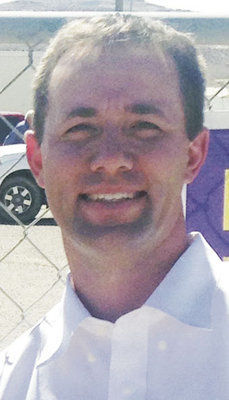After a term marked by controversy, San Juan County Clerk/Auditor John David Nielson submitted his resignation to the San Juan County Commission on June 23. Neilson has served in the position since 2015; July 14 will be his final day.
“I feel that it is the right thing to do for myself and for my family as I move on to the next chapter of my life,” Nielson wrote in a letter he presented to the San Juan County Commission. Nielson, a Blanding native, has spent his last 17 years in Monticello working for Zions Bank and San Juan County. He was re-elected as county clerk in 2017 and has 18 months left on his current term. Nielson now has plans to work at an accounting firm in Spanish Fork, Utah after resigning.
James Francom, who currently serves as the county’s deputy clerk, will serve as the interim clerk/auditor or temporary manager until Nielson’s replacement is found and sworn into office. Kim Henderson, the San Juan County Utah Republican Party Liaison, must name a replacement for Nielson who will serve as the county clerk until the next county-wide election next year in 2022.
“Working as the clerk has been challenging and rewarding. I have learned many lessons, grown in my knowledge of government, and as a person,” Nielson said. “It has been a privilege to serve, to the best of my abilities, the citizens of San Juan County.”
Utah’s portion of the Navajo Nation lies in San Juan County, which stretches from the Colorado state line to Navajo Mountain. For decades, elections have been disturbed by repeated lawsuits, criminal accusations and Voting Rights Act violations. The American Civil Liberties Union of Utah sued San Juan County in 2016 for violating the Voting Rights Act.
In 2018, Nielson removed Willie Grayeyes, an Indigenous San Juan County Commissioner candidate, from the county commission ballot. County officials and Grayeyes’ Republican opponent claimed that Grayeyes was not a resident of Utah, in what many perceived as a politically- and racially-motivated move.
Ultimately, Grayeyes won both a lawsuit and his election, cementing the first majority-Navajo San Juan County Commission in history. United States District Judge David Nuffer ruled that Grayeyes’ name was improperly invalidated, and that Nielson had backdated a document to make the complaint about Grayeyes valid.
“It appears that Mr. Nielson backdated official county documents in an attempt to strip Willie Grayeyes of his candidacy,” said Leonard Gorman, executive director of the Navajo Nation Human Rights Commission, at the time. “It’s clear that Nielson made egregious, if not purposeful, errors in disqualifying Mr. Willie Grayeyes as a candidate.”
The Grand County Sheriff’s Office was asked to investigate Nielson for possible criminal charges, but former Grand County Attorney Andrew Fitzgerald decided not to bring charges.
An electioneering complaint against Nielson remained under legal review from October to December 2019, after legal observers discovered that Nielson distributed partisan election materials inside polling locations in the same year. Poll monitors with Utah’s ACLU found reprints of an opinion piece that had been published in the San Juan Record in September 2019 by Blanding Mayor Joe B. Lyman in favor of Proposition 10 throughout voting locations on the Navajo Nation.
Proposition 10 was a ballot initiative that would create a study committee to recommend changes to San Juan County’s governmental structure by potentially changing the county commission from three to five members. Proposition 10 narrowly failed in November 2019.
Lyman’s letter published in the Record was a response to Commissioner Kenneth Maryboy’s assertion that Proposition 10 was proposed to threaten the San Juan County Commission’s newly minted Navajo- and Democrat-majority. Lyman rebuked the accusation, writing that he floated the proposition before the commission’s leadership changed and that it held support from a diverse group of sponsors.
The article had been highlighted and placed next to official election materials provided by San Juan County. “The presence of such material at a polling location raises serious questions about electioneering, defined as a deliberate attempt inside or nearby a polling location to influence voters to vote for a particular candidate or issue,” a statement from Utah’s ACLU read at the time. In Utah, electioneering is a class A misdemeanor punishable by a year in jail and a $2,500 fine.
Nielson told the Salt Lake Tribune in 2019 that distributing the op-ed was “meant to be informative” and that “the idea that this could be swaying [voters] never crossed [his] mind.”
An investigation into the potential electioneering was then administered by the Weber County Sheriff’s Office.
“The standard practice for dealing with a potential conflict of interest is to get someone else to step in,” San Juan County Attorney Kendall Laws told the Moab Sun News in 2019. “In this case, both the Sheriff and I thought that someone else would be better investigating the matter. We’re grateful that Weber County was able to do both.”
Weber County Attorney Christopher Allred completed the investigation in December 2019, which was sent back to Laws for review.
“We do not intend to formally screen the case for charges,” Allred said at the time. “My understanding is that the San Juan County attorney will reach out to another prosecution agency to screen the case and potentially follow through with any prosecution.”
Nielson was never charged.
“This was not an easy decision. Making the difficult decision to resign has been thought and considered over several weeks,” Nielson said. “My roots are in San Juan County. I have lived almost my entire life here and will always call San Juan County home.”




